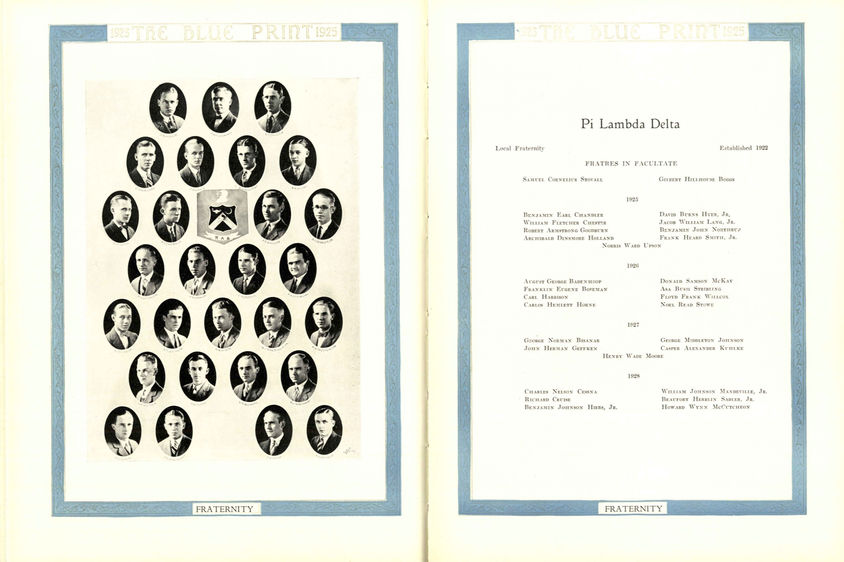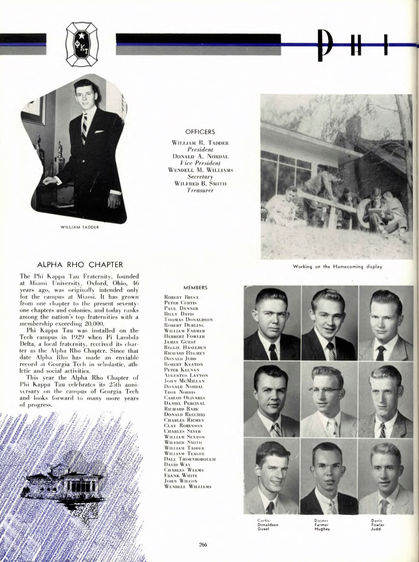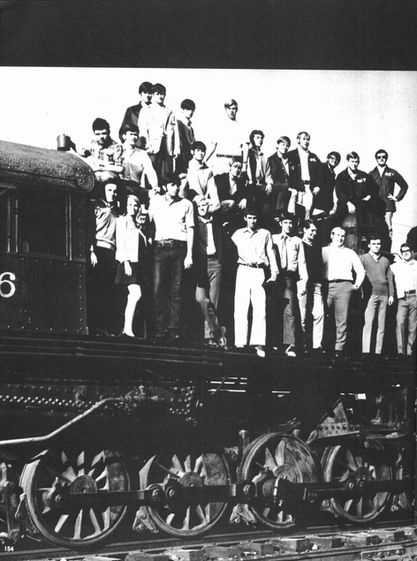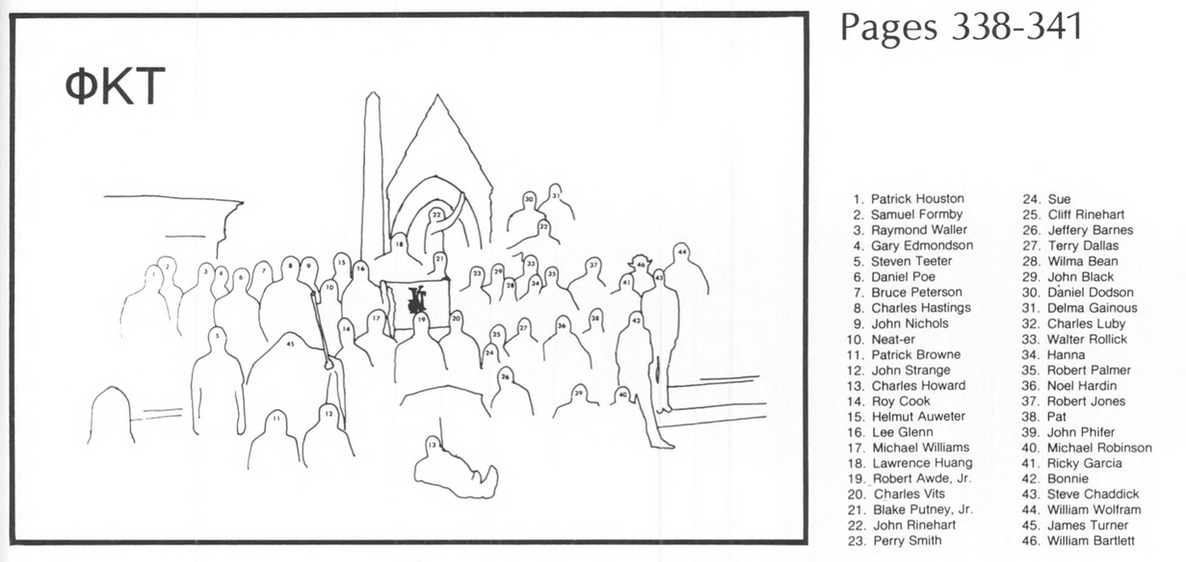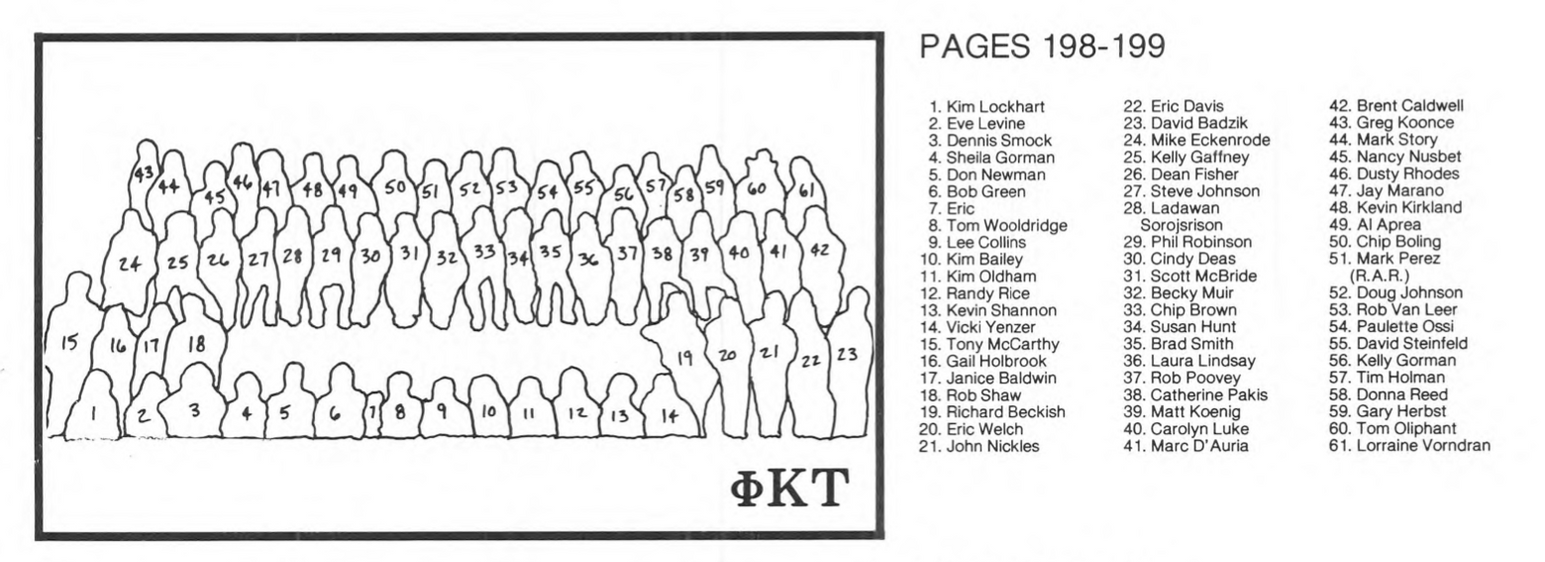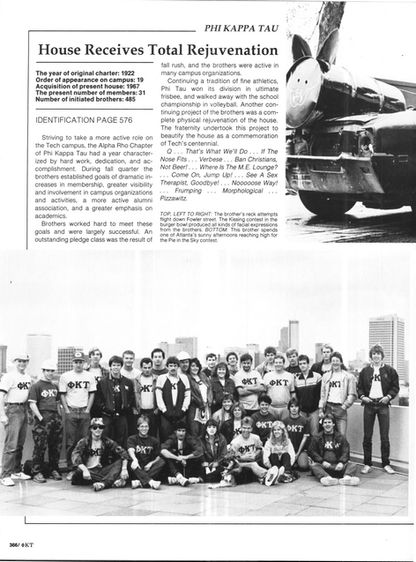The 1920s
Soon after the opening of the 1921-22 school term, C.F. Hollberg and several of his closest friends, after carefully investigating the fraternity situation at the Georgia School of Technology, met and decided to form a local fraternity. The necessary twenty-five members were elected and in January 1922 a petition requesting recognition for Pi Lambda Delta was submitted to the Pan-Hellenic Council and approved.
"Scholastic First" was stressed from the beginning and each member was required to have at least two campus activities. The first house came in September 1923 and was located on Peachtree Street. Late in that same year, an Alumni Club was organized and a program inaugurated whereby each Alumnus signed $100 notes for a building fund. The Petition Committee to study national fraternities was organized in 1924 and began then to look to Phi Kappa Tau. The first contact with the fraternity came through Arthur A Johnson, California. Robert M. Ervin, Centre, a member of the faculty at Georgia Tech worked closely with Pi Lambda Delta both before and during their days of petitioning Phi Kappa Tau. As early as 1924 the group contacted Phi Kappa Tau, but it was not until March 1929 that their petition was approved by mail ballot of the chapters.
The installation took place over the weekend of April 25 to 27. The degree team included Grand President I. M. Wright; Past Grand President E. E. Brandon; Granz Secretary R. K. Bowers; Domain Chief Harley W. Chandler; representatives from Auburn including J. M. Robinson, Miami, and Robert Willingham, Norman McInnis and Williar Harris; and representatives from Florida who were A.C. Deen, George Scofield, Pet, Peterson and Lewis Blalock. Initiations were conducted at the Knights of Columbus hall. The initiation banquet was held at the Atlanta Athletic Club with T. M. Holland, one of the founders of Pi Lambda Delta, as Toastmaster. Speakers were Alpha Rho Presider Don W. Frakes, Bowers, Chandler, Robinson, Ervin, Brandon, Wright, and Sid, Richardson, and alumnus. The charter, number forty-one, was presented on Saturday morning in appropriate ceremonies.
The 1930s
The 1930 school year saw four of the members of Alpha Rho elected to honorary fraternities and A. W. Hale awarded a gold "T" for his football activities. Chapter scholarship jumped from twenty-eighth to eighth and members held a large percentage of positions in the campus publications.
In 1931-32 members of Alpha Rho were to be found in every major sport at Georgia Tech, a great number of the members were added to the list of members in honorary societies. In 1933 the chapter's scholastic standing rose to fourth place among all fraternities on the campus. During 1933-36 the chapter moved to first place. The chapter continued it's successes but with difficulty as a result of the late depression years. Membership decreased, and financial obligations mounted. During the 1938-39 school year, there was not one person initiated at Alpha Rho. The chapter was unable to reopen it's house when the school term began in 1939.
The 1940s
The chapter was reactivated in 1946. Faculty advisor and organizer of the chapter was Robert M. Ervin, Centre, who played a leading part in the original affiliation of the group with Phi Kappa Tau. Ervin selected seven men to form the nucleus of the chapter. Colonel Robert L. Watkins, a charter member of the chapter, was the most instrumental in bringing about the reactivation of the group. Before the college year began in September, the first members were initiated into Phi Kappa Tau by Alpha Chi chapter at Mississippi State College. In just 125 days, the chapter grew form seven men to thirty two. The development was remarkable and built on a sturdy foundation. Housing was an immediate problem that was surmounted with the purchase of a suitable home.
The 1950s
Scholarship again was high and Alpha Rho was ranked fourth on campus and second in Phi Kappa Tau in 1950-51. The chapter was fifth among Georgia Tech fraternities in 1951-52 and seventh the following year. During the time period spanning from 1951-1955, a steady rise in initiated new members took place.
The 1960s
Although there was a gradual drop in the number of new initiates in the early sixties, Alpha Rho continued it's stride for success. It's determination paid off during the 1964-65 school year, because Alpha Rho won the High Scholarship Award in Domain IV of the Phi Kappa Tau Fraternity. The late sixties was a time of diversity for Alpha Rho, noted by the aspect that the brothers participated in a wide scope of sports such as golf, bowling, cross country, swimming and softball. In February 1968, the brothers won their league in the bowling championship. Alpha Rho, also, continued it's commitment to public service by actively taking part in the Empty Stocking Fund Drive and taking orphans to baseball games and the zoo. One of the more important projects of the sixties was the building of the current chapter house. Major problems of the first house plans being too expensive to build caused changes in the plans which decreased the cost from $211,000 to $175,000 for the new house. This project undertaken by the chapter seemed to be a test of the chapter's strength. Demolition of the old chapter house took much longer to complete than expected, and the Board of Governors ran into trouble acquiring a loan. Chapter spirit hit a low in sports and other areas. However, the chapter pulled through these times, and in 1969 the chapter initiated the third most number of new brothers in the history of Alpha Rho.
The 1970s
The number of initiated during the seventies was fairly constant at around 11 new brothers a year. The chapter rallied after the problems incurred with the new house. Alpha Rho took first place in bowling for 1970 and placed sixth overall on campus in scholarship. Although scholarship was high, some problems forced the chapter to 24th fraternity overall on campus for that year. However, in 1972 Alpha Rho took first place in the Ramblin Reck Parade, and it was a turning point for the brotherhood. Then in 1978, the chapter placed second in the contraption category in the Ramblin Reck Parade.
The 1980s
In the early eighties, the Phi Tau's saw a resurgence which greatly strengthened the brotherhood. Not only did the chapter grow in size, it worked together to capture first place overall winner in the 1982 Homecoming events. The brotherhood accomplished this feat by not only winning their division in the Homecoming display but also capturing the coveted first place in the contraption category of the Ramblin Reck Parade. In addition to a strong brotherhood, the chapter benefited from capable administrators and a strong faculty advisor. In fact, our present advisor, Dr. Robert Hayes received the Brandon Award in 1982 for his services to the chapter. In keeping with the continued success of Alpha Rho, the chapter placed first in their division in Greek Week and Homecoming in each of the years from 1985 to 1989. Also the string of accomplishments continued with placing third overall in both Homecoming and Greek Week in 1987. During the mid eighties the chapter witnessed an increase of associate members initiated from under five men in 1984 to almost 20 men in 1987. This growth in size has sustained the continued strength and success of the chapter with it's present high point being the recipient of the Hap Angelo Award for the most improved chapter in Phi Kappa Tau in 1988 and the Division III Maxwell Award in 1989 for best chapter in Phi Kappa Tau in a large campus (20+ Fraternities).
In 1990, Alpha Rho won the overall Maxwell Award for the most outstanding chapter in Phi Kappa Tau!
The Alpha Rho chapter has consistently strove for excellence in the early nineties in Homecoming and Greek Week. This effort has not been without reward. We have won overall Homecoming competition in 1991 and 1992 and finished second overall in 1990. Alpha Rho has also proved itself in the Greek Week competition by finishing first place in the C division in 1990, '91, '92, '94, and first in D division in '95. In 1996-1997, Alpha Rho had a strong showing in Homecoming. We placed second overall, first in the display and in the fixed body wreck competition. We placed fifth in Greek Week. We were also a runner up for the prized Maxwell award for the second year in a row. In 1997-1998, we placed 1st overall in Homecoming, first in display and fixed body wreck competition. Again, we placed 5th in the annual Greek Week competition. We won Homecoming again in 1999-2000 with 15t in display, fixed body wreck and the normal wreck competition.
The 1990s
In 1990, Alpha Rho won the overall Maxwell Award for the most outstanding chapter in Phi Kappa Tau!
The Alpha Rho chapter has consistently strove for excellence in the early nineties in Homecoming and Greek Week. This effort has not been without reward. We have won overall Homecoming competition in 1991 and 1992 and finished second overall in 1990. Alpha Rho has also proved itself in the Greek Week competition by finishing first place in the C division in 1990, '91, '92, '94, and first in D division in '95. In 1996-1997, Alpha Rho had a strong showing in Homecoming. We placed second overall, first in the display and in the fixed body wreck competition. We placed fifth in Greek Week. We were also a runner up for the prized Maxwell award for the second year in a row. In 1997-1998, we placed 1st overall in Homecoming, first in display and fixed body wreck competition. Again, we placed 5th in the annual Greek Week competition. We won Homecoming again in 1999-2000 with 15t in display, fixed body wreck and the normal wreck competition.
The 2000s
In the Fall of 2017, Darryl Thompson, a representative from the Phi Kappa Tau National Fraternity, tabeled outside the vacant home during rush week and recruited a new set of Founding Fathers to reboot the Alpha Rho Chapter. Those men were Patrick Kitchens, Zach Cole, Cameron McIntosh, James Thompson, Kyle Hanson, Nikhil Patel, Walker Smith, Roderick Cummings, and Zach Parham.
The 2010s
The 2020s
The Coronavirus Pandemic forced the rechartering date of the colony to be postponed. Nevertheless, the colony has persevered and participated in homecoming and greek week events. Despite an altered Rush process, Alpha Rho has managed to recruit a proportionally large amount of members for their relatively small size. In addition, Phi Tau has retained a strong and philanthropic alumni network. The colony finally rechartered on May 1st, 2021, ready to reclaim its position as one of Georgia Tech's top fraternities.
*The Georgia Tech Blueprint seized production in 2018, and we currently do not have access to issues later than 2012. In their place, Chapter Composites will be uploaded. You may also check out The Alpha Rhover page for yearly activities and accomplishments.
Chapter Houses
During the life of Alpha Rho, the chapter has occupied at least nine different houses. Upon the establishment of Pi Lambda Delta, the local fraternity that eventually chartered as Phi Kappa Tau, brothers occupied 755 Peachtree Street. The home for the chapter at the time on installation in 1929 was 116 North Avenue, N.W. It was previously believed that they resided there until 1935, but according to photographs and stats in The Georgia Tech Blueprint the fraternity lived in two additional homes between 1931 and 1935, the latter being 830 Spring Street, which was previously occupied by Kappa Sigma. The location of the first home is currently unknown, but it is estimated that Phi Kappa Tau only lived there temporarily for one year. The fraternity then moved to 760 Williams Street, N.W., in the fall of 1935. In the fall of 1938 the chapter moved to 737 Williams Street, N.W., but they could not reopen the house when the school term began in 1939 due to financial struggles resulting from the late Great Depression years. During World War Two, the fraternity was not active and did not occupy a house. When the chapter was reactivated, a house was acquired at 112 Fifth Street, N.W., in the fall of 1947. When the land was needed for a super-highway, the fraternity purchased a home at 175 Fourth Street, N.W., in the fall of 1948 and there has been a Phi Tau home on that property since then. This is also the home the chapter lived in while Mrs. Gertrude Suchke was the house mother. Major repairs on the dwelling made it quite suitable for fraternity living and served Alpha Rho quite well until the long range goal of construction a new fraternity house was realized. In 1968 a new house was built on the site and has been the home of Alpha Rho ever since. In the summer of 1995 a major renovation was undertaken to prepare the house for the Olympics and make it suitable to live in for the foreseeable future. More improvements and renovations to the home were made in 2018 before the Alpha Rho Colony reentered the house. All of Alpha Rho's previous homes have been demolished to make way for buildings in midtown, the interstate, and developments for the Olympic Games in 1996. For instance, the site of Phi Tau's house upon installation is now North Avenue Dining Hall.
*Due to insufficient Record-Keeping before 1935, the Dates of Occupancy are Approximated based on the Editions of The Georgia Tech Blueprint.

755 Peachtree Street
1923 - 1929 (Pi Lambda Delta House)

830 Spring Street
1932 - 1935

112 Fifth Street, N.W.
1947 - 1948

116 North Avenue, N.W.
1929 - 1931

Location Unknown.
1931 - 1932

760 Williams Street, N.W.
1935 - 1938

737 Williams Street, N.W.
1938 - 1939

175 Fourth Street, N.W. (1)
1948 - 1968

175 Fourth Street, N.W. (2)
1968 - 2008

175 Fourth Street, N.W. (Remodel)
2008 - Present




